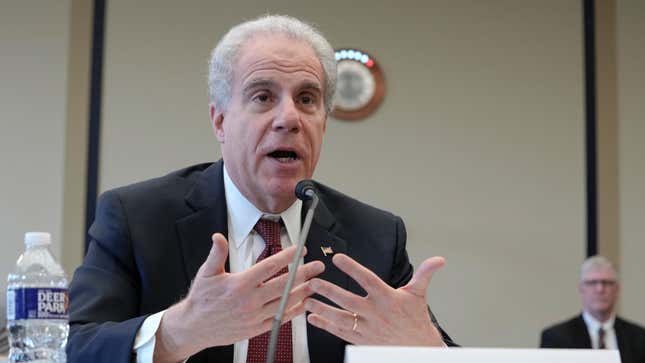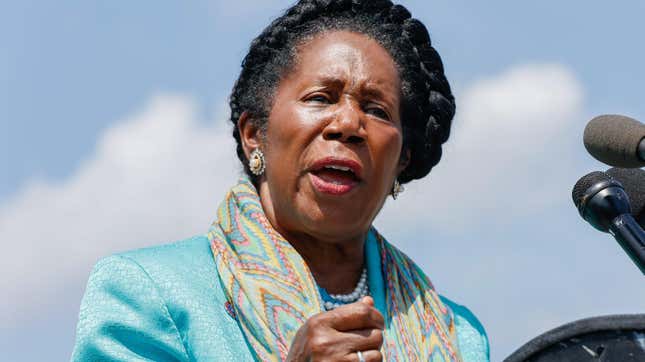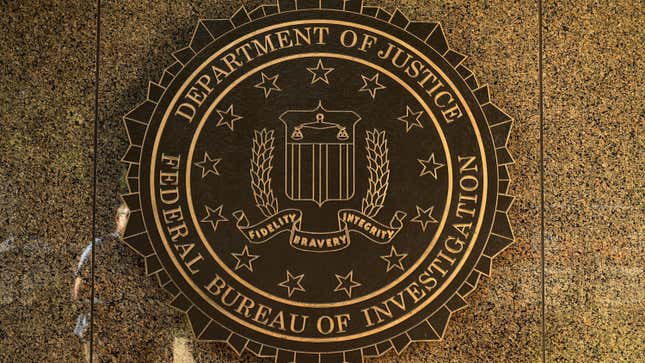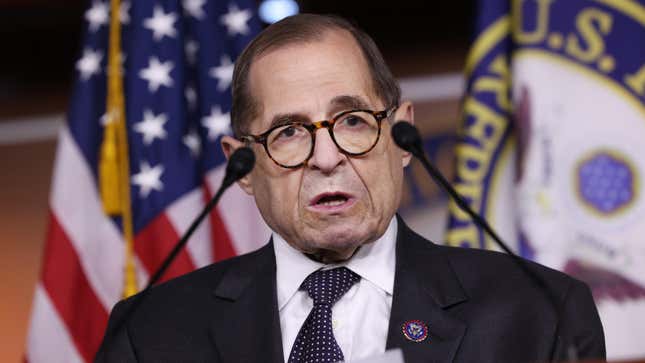
Michael Horowitz, Department of Justice Inspector General, testifies during the House Judiciary Crime and Federal Government Surveillance Subcommittee hearing on FISAPhoto: Mariam Zuhaib (AP)
Members of the House Judiciary Committee kicked off what could be months of fiery debates over one of the US’s most controversial warrantless surveillance programs this week. In the hearing Thursday titled, “FIX FISA,” lawmakers from both sides of the political aisle voiced concerns over the scale of US citizen data “routinely collected” under Section 702 of the Foreign Intelligence Surveillance Act. Civil liberties groups are pressuring lawmakers to let the controversial program die when it comes up for a reauthorization vote at the end of the year.
Experts witnesses testifying at the hearing were unable to provide lawmakers with concrete figures or even rough estimates on the total amount of US user data “incidentally” sucked up during foreign surveillance operations. The witnesses—and most lawmakers present—uniformly agreed that the controversial program lacked sufficient oversight and transparency. The Representatives were less united, however on whether or not the program could be improved through reforms or needed to be abandoned altogether.
“The warrantless collection of the data should give Americans pause,” New York Representative Jerry Nadler said during the hearing. “Section 702 has been a threat to civil liberties for years.”
Here are six of the key takeaways from the hearing.

Photo: Chip Somodevilla (Getty Images)
Most of the lawmakers speaking during the hearing Thursday agreed Section 702 likely required reforms but few seemed willing to abandon the practice altogether. Few that is, besides Ohio Rep. Jim Jordan. During his exchange with the panel of experts, Jordan expressed outrage over the lack of transparent data available illustrating the amount and types of US citizen data made available to intelligence agencies via Section 702. He then questioned whether the FBI, who he holds in low regard, should have access to that type of data in the first place.
“How about if we just get the FBI out of that business altogether?”Jordan said to a long pause.
Jordan went on to say he believed deciding whether or not to reauthorize Section 702 later this year “is probably the most important thing we’re going to do this congress.”

Photo: Jemal Countess (Getty Images)
Texas Democratic Rep. Sheila Jackson Lee, though acknowledging some privacy advocates’ concerns regarding Section 702, appeared far more reluctant to advocate for reforms than her colleagues on the committee. Jackson Lee cited, without details, multiple cases of thwarted terrorist attacks attributed to intelligence gleaned from Section 702 actions. Jackson Lee, who was once a fierce opponent of the war in Iraq, cited Bush-era terrorist rhetoric as justification for maintaining the foreign surveillance program.
In an odd exchange, Jackson Lee implied 702 could potentially be used to collect intelligence against alleged Pentagon leaker Jack Teixeira. The Texas representative said she was aware of some “foreign contacts” who Teixeira may have communicated with. She then asked how 702 could be “engaged” in that situation.
“It wouldn’t be willy-nilly,” Jackson Lee said. The witnesses did not directly answer that hypothetical.

Photo: Chip Somodevilla (Getty Images)
Anyone looking to discover new revelations of data collected under Section 702 were left sorely disappointed. In fact, possibly the biggest overarching takeaway from the hearing was just how little lawmakers, or the public, know about the type or scale of data colled under the FISA program. US Privacy and Civil Liberties Oversight Board Chair Sharon Bradford Franklin told lawmakers they “don’t actually know the scope of this [data] collection,” and said that the FBI specifically refused to provide concrete figures, or even an estimate, on the amount of communications iti collects on US citizens. The FBI, according to Franklin, said that process would be “infeasible.”

Sharon Bradford Franklin, U.S. Privacy and Civil Liberties Oversight Board Chair, testifies during the House Judiciary Crime and Federal Government Surveillance Subcommittee hearing on FISAPhoto: Mariam Zuhaib (AP)
Though some of lawmakers on the Hosue committee appeared surprised or even outraged over the prospect of US citizen data being sucked up during foreign surveillance operations, the experts clarified that the seeming loophole is actually a core foundation of Section 702. “Incidental collection,” Franklin told lawmakers is a “recognized feature” of the program.
“The fact that somebody is talking to a foreign target overseas,” Franklin said, “Is known and recognized and not necessarily a problem.” It can be useful, she said, for authorities to identify potential threats in the US gleaned from the information.
Franklin said the real threat to civil liberties in the case comes not necessarily from the collection of the data, but from the ease with which intelligence agencies like the FBI can search for American names in the database of communications.

Federal Bureau of Investigation Director Christopher Wray prepares to testify before the House Homeland Security CommitteePhoto: Chip Somodevilla (Getty Images)
While both Republicans and Democrats on the judiciary committee shared concerns over potential FISA misuses, members of the GOP were far more critical of the FBI as an institution. Multiple lawmakers used the hearing as a platform to sound off on what they viewed as an overly politicized organization with a seemingly personal vendetta against former President Donald Trump. Wisconsin Republican Rep. Thomas Tiffany took those accusations.
“Is the FBIs obsession with politics undermining crime-fighting in America,” Tiffany asked. He then said he was skeptical any reforms proposed by Congress would actually see the light of day.
“Can we trust them [the FB]I to reform?” he asked.

Photo: Kevin Dietsch (Getty Images)
Experts speaking during the hearing appeared to leave lawmakers with more questions than answers but a few common reform proposals managed to squeeze their way. Multiple lawmakers, including New York Rep Jerry Nadler and Rhode Island Rep David Cicilline both expressed interest in proposing new reforms requiring the FBI or other intelligence agencies to obtain a search warrant before they could retrieve US citizens’ communication data stored in Section 702 databases.
Texas Republican Rep Troy Nehls, who previously served as a sheriff, expressed similar concerns. He said it was more difficult for police at a local level to obtain communications than it was for federal agents trying to gather data using Section 702.


















 English (United States) ·
English (United States) ·